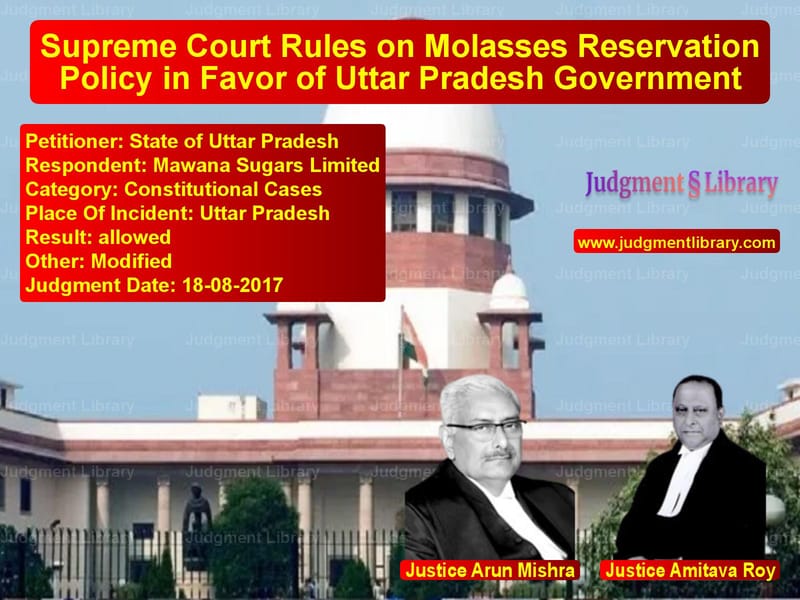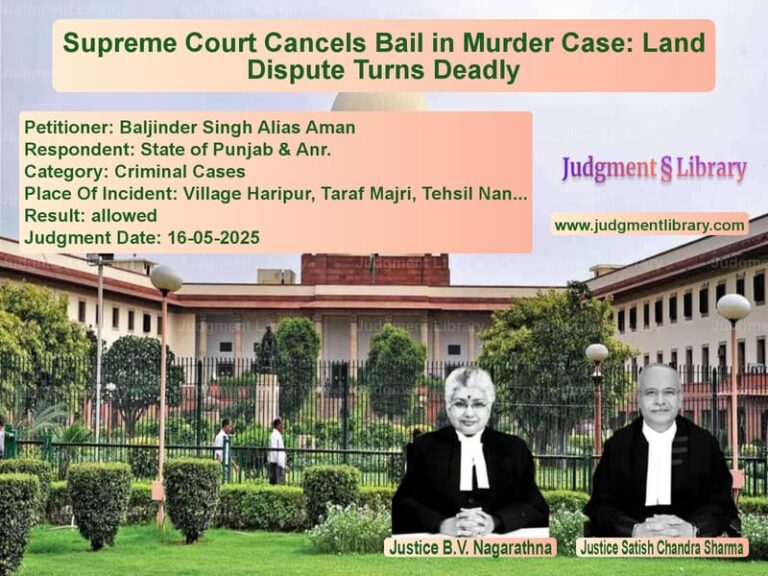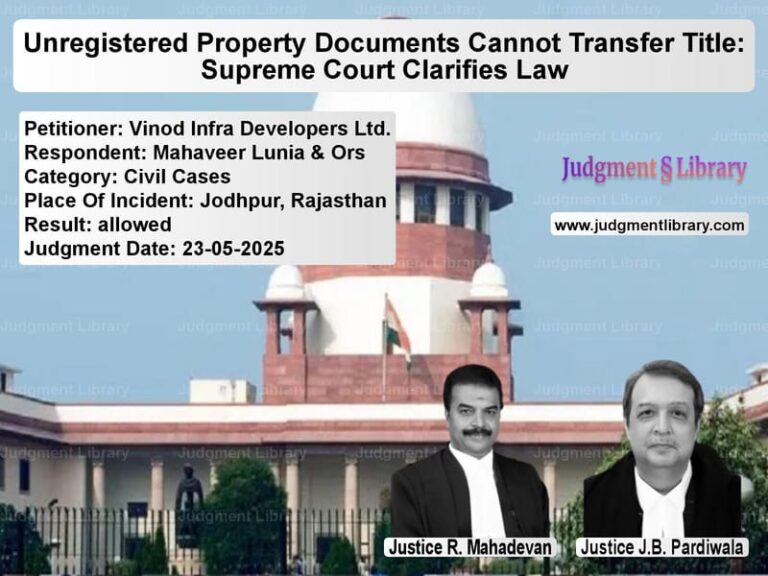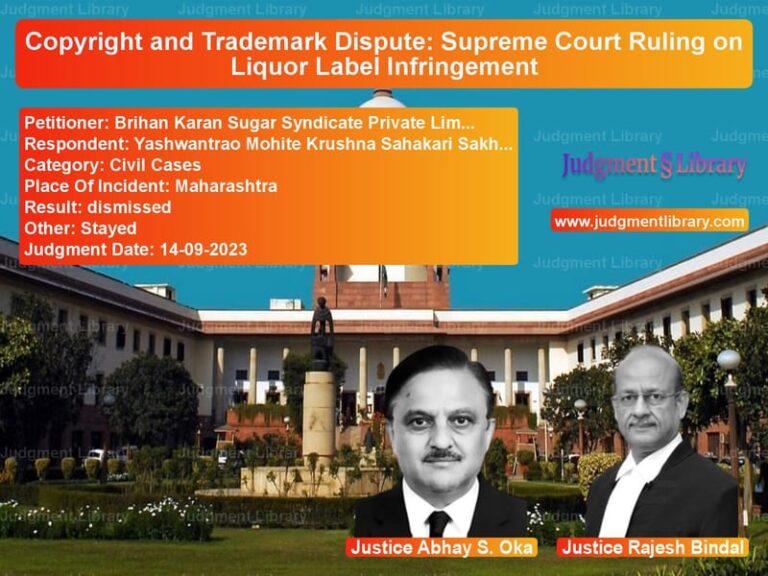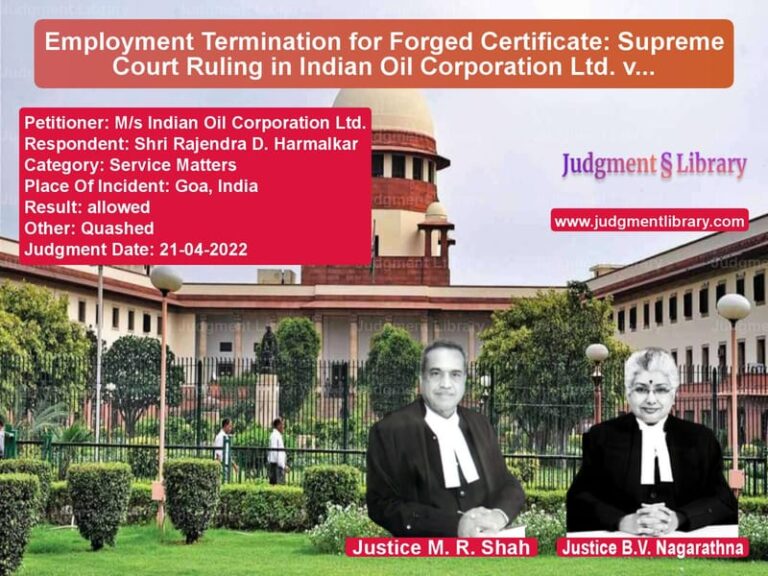Supreme Court Rules on Molasses Reservation Policy in Favor of Uttar Pradesh Government
The Supreme Court of India, in the case of State of Uttar Pradesh & Others vs. Mawana Sugars Limited, delivered a crucial judgment regarding the reservation and distribution of molasses produced by sugar mills. The Court upheld the State Government’s policy requiring sugar mills to reserve a portion of their molasses for supply to distilleries manufacturing country liquor.
Background of the Case
The dispute arose from the Molasses Policy for the year 2015-16 issued by the Uttar Pradesh Government. The policy mandated that sugar mills reserve 25% of their total molasses production for supply to country liquor distilleries. Mawana Sugars Limited, a major sugar manufacturer operating in Uttar Pradesh, challenged this policy, arguing that the reservation should apply only to the balance stock of molasses after captive consumption, rather than the total production.
The Allahabad High Court ruled in favor of Mawana Sugars, holding that the company should be allowed to retain 25% of the balance stock of molasses after captive consumption, and supply the rest to country liquor distilleries. The State Government appealed against this decision in the Supreme Court, arguing that the High Court had misinterpreted the policy.
Key Legal Issues Considered
- Whether the Molasses Policy for 2015-16 mandated reservation of 25% of total production or 25% of balance stock after captive consumption.
- Whether the High Court misapplied the Supreme Court’s precedent in Dhampur Sugar Mills Ltd. vs. State of U.P.
- Whether the policy was necessary to ensure a stable supply of molasses for country liquor manufacturing.
- Whether the policy was within the legislative competence of the State Government under the Uttar Pradesh Sheera Niyantran Adhiniyam, 1964.
Petitioner’s (State of U.P.) Arguments
The State of Uttar Pradesh, represented by senior counsel, made the following arguments:
- The policy mandated reservation of 25% of total molasses production, not just the balance stock.
- The High Court erroneously relied on Dhampur Sugar Mills, which dealt with a different policy and could not be applied to the 2015-16 policy.
- The reservation was necessary to ensure adequate supply for country liquor manufacturing, which was a major revenue source for the State.
- Without a mandatory reservation, sugar mills could hoard molasses or sell it at higher prices to private distilleries, disrupting supply to country liquor manufacturers.
Respondent’s (Mawana Sugars Ltd.) Arguments
Mawana Sugars Ltd., represented by senior counsel, countered with the following arguments:
- The policy should be interpreted in line with Dhampur Sugar Mills, which held that reservation should apply only to balance stock after captive consumption.
- The sugar mills had invested in distilleries to ensure self-sufficiency and should not be forced to give up molasses required for their own operations.
- The government’s argument that the reservation applied to total production contradicted past policies and was unfair to integrated sugar-distillery businesses.
- The High Court correctly interpreted the policy to protect the interests of sugar manufacturers.
Supreme Court’s Analysis and Judgment
The Supreme Court, comprising Justices Arun Mishra and Amitava Roy, ruled in favor of the State Government. The key findings were:
1. The Policy Clearly Required Reservation of 25% of Total Production
The Court rejected the interpretation given by the High Court and held that the policy explicitly required sugar mills to reserve 25% of their total production for supply to country liquor distilleries:
“The reservation policy for the Molasses Year 2015-16 mandates that every sugar mill must keep 25% of the molasses produced reserved. The High Court’s interpretation, limiting the reservation to balance stock after captive consumption, is incorrect.”
2. Misapplication of Dhampur Sugar Mills
The Supreme Court found that the High Court had wrongly applied the judgment in Dhampur Sugar Mills. That case dealt with a different policy, which had distinct provisions for reservation based on balance stock. The 2015-16 policy was framed differently and required a broader reservation.
“The reliance on Dhampur Sugar Mills was misplaced. The policy under consideration in that case was materially different from the policy in question.”
3. Justification for the Reservation Policy
The Court emphasized the necessity of reserving molasses for country liquor distilleries:
“The reservation policy is essential to maintain a stable supply of molasses for country liquor production, which is a major revenue source for the State and ensures the availability of safe and affordable liquor to consumers.”
4. Sugar Mills Must Comply with the Reservation Requirement
The Supreme Court directed Mawana Sugars Ltd. and other sugar mills to comply with the policy and supply the required quota of molasses to country liquor manufacturers.
Final Orders
- The Supreme Court set aside the High Court’s judgment.
- The State Government’s interpretation of the policy was upheld.
- Mawana Sugars Ltd. was directed to comply with the 25% reservation requirement.
- The policy was deemed essential for maintaining the availability of molasses for country liquor production.
Legal Implications
1. Clarification of Reservation Policies
The judgment provides clarity on how reservation policies should be interpreted, ensuring consistency in government regulations.
2. Strengthening State Control Over Essential Commodities
The ruling reinforces the authority of State Governments to regulate essential commodities like molasses in the interest of public welfare.
3. Protection of Country Liquor Manufacturing
The decision ensures that adequate raw materials are available for country liquor production, safeguarding both revenue interests and public health.
Conclusion
The Supreme Court’s judgment in State of Uttar Pradesh & Others vs. Mawana Sugars Ltd. upholds the State Government’s authority to regulate molasses distribution and ensures a stable supply for country liquor production. By rejecting the High Court’s interpretation, the ruling clarifies the legal framework governing essential commodity reservation and strengthens the enforcement of economic policies in the interest of public welfare.
Don’t miss out on the full details! Download the complete judgment in PDF format below and gain valuable insights instantly!
Download Judgment: State of Uttar Prade vs Mawana Sugars Limite Supreme Court of India Judgment Dated 18-08-2017.pdf
Direct Downlaod Judgment: Direct downlaod this Judgment
See all petitions in Legislative Powers
See all petitions in Public Interest Litigation
See all petitions in Separation of Powers
See all petitions in Judgment by Arun Mishra
See all petitions in Judgment by Amitava Roy
See all petitions in allowed
See all petitions in Modified
See all petitions in supreme court of India judgments August 2017
See all petitions in 2017 judgments
See all posts in Constitutional Cases Category
See all allowed petitions in Constitutional Cases Category
See all Dismissed petitions in Constitutional Cases Category
See all partially allowed petitions in Constitutional Cases Category

